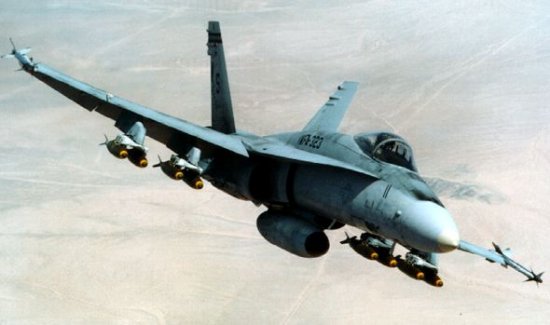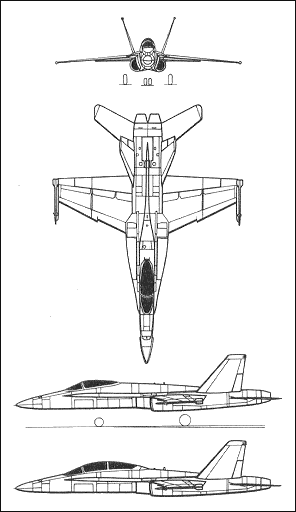|
||||||||||
|
|
||||||||||
|
||||||||||
|
|
||||||||||
 - -
|
|

|
McDonnell Douglas (now Boeing)/ Northrop F/A-18 Hornet Multi-Role Fighter |
|
DESCRIPTION:
The F-18 Hornet is based on the earlier Northrop YF-17 Cobra. The YF-17 had been developed to compete with the F-16 in the US Air Force's Lightweight Fighter Competition of the 1970s. Though the USAF eventually selected the F-16, the US Navy felt that Northrop's concept offered greater potential as a replacement for the aging A-7 Corsair attack fighter. Northrop and McDonnell Douglas agreed to jointly produce an F-18 fighter version for the Navy and an A-18 attack variant for the Marines, but the two missions were later combined. The result was the multi-mission F/A-18 Hornet. In keeping with its multi-role designation, at the heart of the F-18 is a multi-mode Hughes radar that is equally effective in air-to-air and air-to ground missions. Combined with an advanced array of avionics, cockpit displays, powerful engines, excellent high angle-of attack aerodynamics, and a wide range of weaponry, the F-18 exceeded expectations in terms of accuracy, maneuverabiity, and overall effectiveness. The F-18 successfully entered service with both the Navy and Marine Corps during the mid-1980s as a replacement for the A-7 and F-4 Phantom II. Production then switched to the upgraded F/A-18C single-seat and F/A-18D two-seat models. Though largely similar externally, the two new F-18 variants feature a number of avionics improvements centering on providing night attack capability. While the earlier F-18B was a trainer only, the rear seat of the F-18D is equipped with mutli-functional displays and sidestick weapons controllers allowing the F-18 to serve as a forward air controller guiding other planes to targets over the battlefield. The F/A-18C/D models ended production in the late-1990s having been superseded by the F/A-18E and F/A-18F Super Hornet. Current plans call for the F-18A/B aircraft to remain in service with the US Navy until about 2015 while F-18C/D models will be retired by 2020. The F-18 has also attracted customers among a number of foreign air forces.
Data below for F/A-18C |
|
| HISTORY: | |
| First Flight |
(F-18A) 18 November 1978 (F-18C) 3 September 1986 (F-18D) 6 May 1988 |
|
Service Entry
|
(F-18A) 7 January 1983 (F-18D) November 1989 |
| CREW: |
(F-18A/C) one: pilot (F-18D) two: pilot, weapon systems officer |
|
ESTIMATED COST:
|
$35 million [2003$]
|
| AIRFOIL SECTIONS: | |
| Wing Root | NACA 65A005 mod |
|
Wing Tip
|
NACA 65A003.5 mod
|
| DIMENSIONS: | |
| Length | 56.00 ft (17.07 m) |
| Wingspan | 37.50 ft (11.43 m) |
| Height | 15.25 ft (4.66 m) |
| Wing Area | 400 ft² (37.16 m²) |
|
Canard Area
|
not applicable
|
| WEIGHTS: | |
| Empty | 23,050 lb (10,455 kg) |
| Normal Takeoff |
36,710 lb (16,6500 kg) [fighter mission] 49,225 lb (22,330 kg) [attack mission] |
| Max Takeoff | 56,000 lb (25,400 kg) |
| Fuel Capacity |
internal: 10,860 lb (4,925 kg) external: 6,730 lb (3,055 kg) |
|
Max Payload
|
15,500 lb (7,030 kg)
|
| PROPULSION: | |
| Powerplant | two General Electric F404-400 afterburning turbofans |
| Thrust |
32,000 lb (142.4 kN) with afterburner
|
| PERFORMANCE: | |
| Max Level Speed |
at altitude: 1,190 mph (1,915 km/h) at 40,000 ft (12,190 m), Mach 1.8 at sea level: unknown |
| Initial Climb Rate | 45,000 ft (13,715 m) / min |
| Service Ceiling | 50,000 ft (15,240 m) |
| Endurance | unknown |
| Range |
fighter mission: 800 nm (1,480 km) attack mission: 1,150 nm (2,130 km) ferry: 1,800 nm (3,335 km) |
| g-Limits |
unknown
|
| ARMAMENT: | |
| Gun | one 20-mm M61A1 Vulcan cannon (570 rds) |
| Stations | seven external hardpoints and two wingtip rails |
| Air-to-Air Missile | AIM-7 Sparrow, AIM-9 Sidewinder, AIM-120 AMRAAM, AIM-132 ASRAAM |
| Air-to-Surface Missile | AGM-45 Shrike, AGM-62 Walleye, AGM-65 Maverick, AGM-84 Harpoon, AGM-84 SLAM, AGM-84 SLAM-ER, AGM-88 HARM, AGM-123 Skipper, AGM-154 JSOW |
| Bomb | GBU-10/12/24/51 Paveway laser-guided, GBU-15 EO-guided, GBU-29/30/31/32/35 JDAM, B-57/61 nuclear, Mk 82/83/84 GP, Mk 20 Rockeye, BLU-107 Durandal, CBU-59 cluster |
| Other |
ECM pods, rocket pods
|
| KNOWN VARIANTS: | |
| YF-17 Cobra | Northrop's entry in the USAF Lightweight Fighter competition, although not selected, US Navy evaluation of the design led to the F/A-18 Hornet |
| F/A-18A | First production model; 371 built |
| AF-18A | One-seat fighter purchased by Australia, based on the F-18A but currently being upgraded to F-18C standard to serve until at least 2011; 57 built |
| ATF-18A | Two-seat trainer for Australia, very similar to the F-18B; 18 built |
| CF-18A or CF-188A | One-seat fighter purchased by Canada, based on the F-18A but fitted with a spotlight for identifying targets at night, a new ILS, and able to carry LAU-5003 rocket pods, Canada plans to keep its aircraft in service until 2017; 98 built |
| EF-18A or C-15 | One-seat fighter purchased by Spain, based on the F-18A but being upgraded to near F-18C standard; 60 built |
| RF-18A | Reconnaissance model, few built and most transferred to research duties with the US Navy and NASA |
| F/A-18B or TF/A-18A | Two-seat trainer; 40 built |
| CF-18B or CF-188B | Two-seat trainer for Canada; 40 built |
| EF-18B or CE-15 | Two-seat trainer for Spain; 12 built |
| F/A-18C | Upgraded one-seat model able to carry the AIM-120 AMRAAM and AGM-65 Maverick, also upgraded with new avionics, a new ejection seat, and small strakes on the LERXs to reduce buffet on the tailfins; 355 built |
| KF-18C | One-seat fighter purchased by Kuwait, based on the F-18C; 32 built |
| F/A-18D | Two-seat night attack fighter for the US Marines, includes the same avionic upgrades as the F-18C |
| KAF-18D | Two-seat trainer for Kuwait; 8 built |
| F/A-18E/F | Significantly upgraded Super Hornet models with lengthened fuselage and enlarged wings |
|
Hornet 2000
|
MDD proposal for an advanced Hornet with enlarged wing and tail surfaces, longer fuselage, new engines, and
an improved cockpit; presumably led to Super Hornet 'E' and 'F' models
|
|
KNOWN COMBAT RECORD:
|
Libya - Operation El Dorado Canyon (USN, 1986) Iraq - Operation Desert Storm (USN, USMC, Canada, 1991) Iraq - Operation Southern Watch (USN, USMC, 1991-2003) Bosnia - Operation Deliberate Force (USN, USMC, Canada, Spain, 1995) Iraq - Operation Desert Fox (USN, 1998) Kosovo - Operation Allied Force (USN, Canada, Spain, 1999) Afghanistan - Operation Enduring Freedom (USN, USMC, 2001-present) Iraq - Operation Iraqi Freedom (USN, USMC, Australia, 2003-present) Libya - Operation Unified Protector (Canada, Spain, 2011) |
|
KNOWN OPERATORS:
|
Australia (Royal Australian Air Force) Canada (Canadian Armed Forces, Air Command) Finland, Suomen Ilmavoimat (Finnish Air Force) Kuwait, al-Quwwat al-Jawwiya al-Kuwaitiya (Kuwaiti Air Force) Malaysia, Tentera Udara Diraja Malaysia (Royal Malaysian Air Force) Spain, Ejército del Aire Española (Spanish Air Force) Switzerland, Schweizer Luftwaffe (Swiss Air Force) United States (US Marine Corps) United States (US Navy) United States (NASA) |
|
3-VIEW SCHEMATIC:

|
|
SOURCES:
|
|


|
Aircraft | Design | Ask Us | Shop | Search |

|
|
| About Us | Contact Us | Copyright © 1997- | |||
|
|
|||